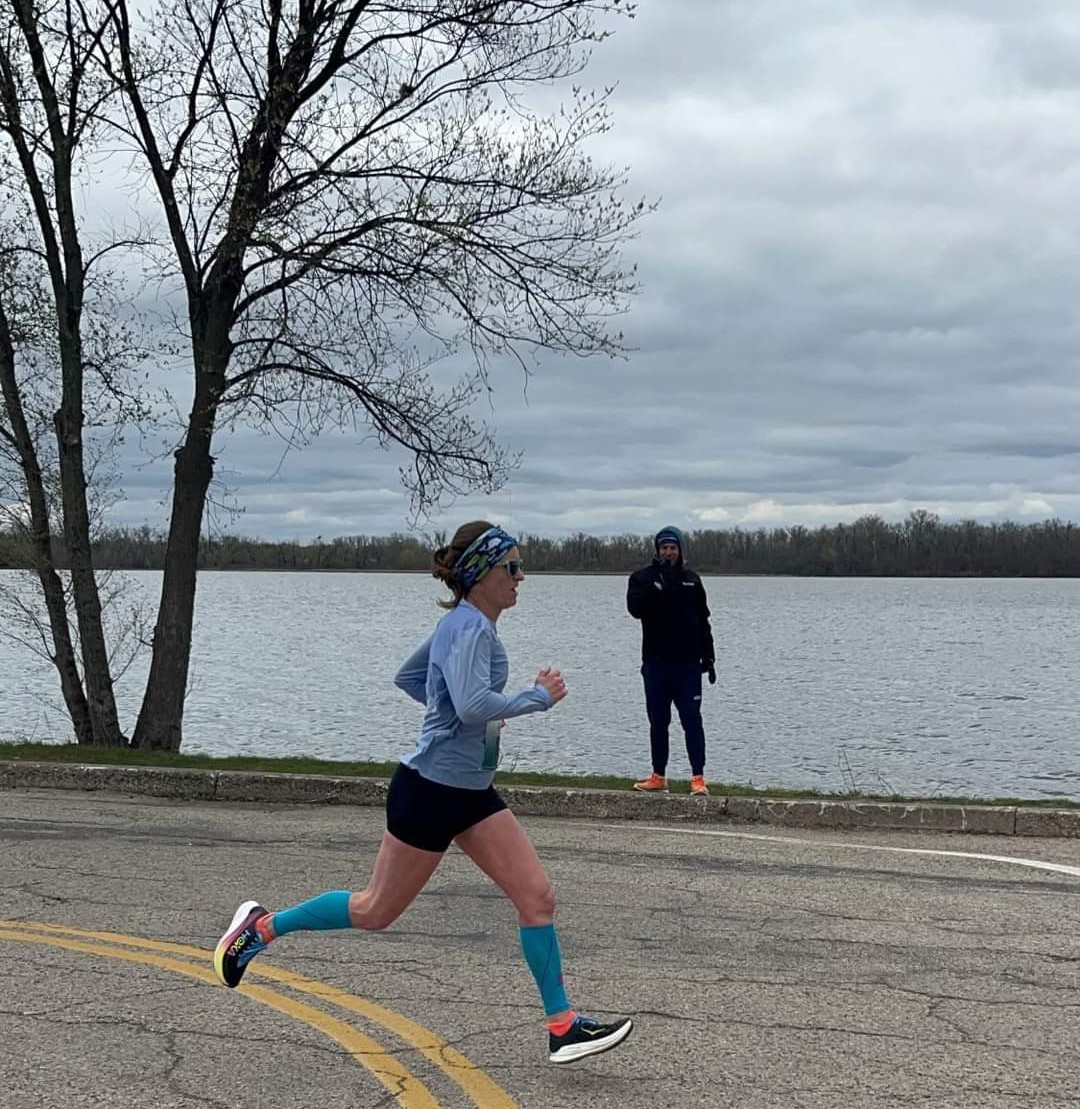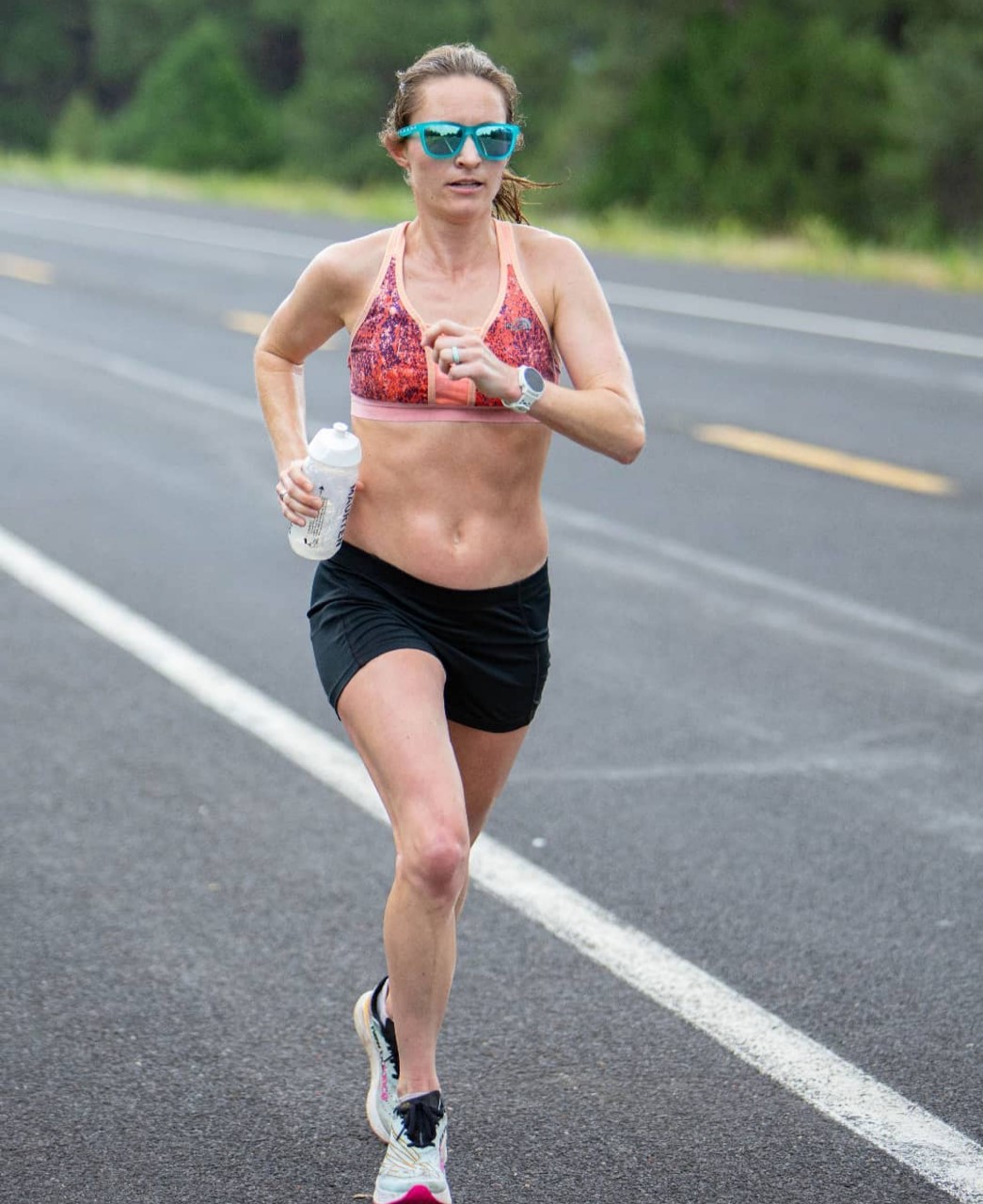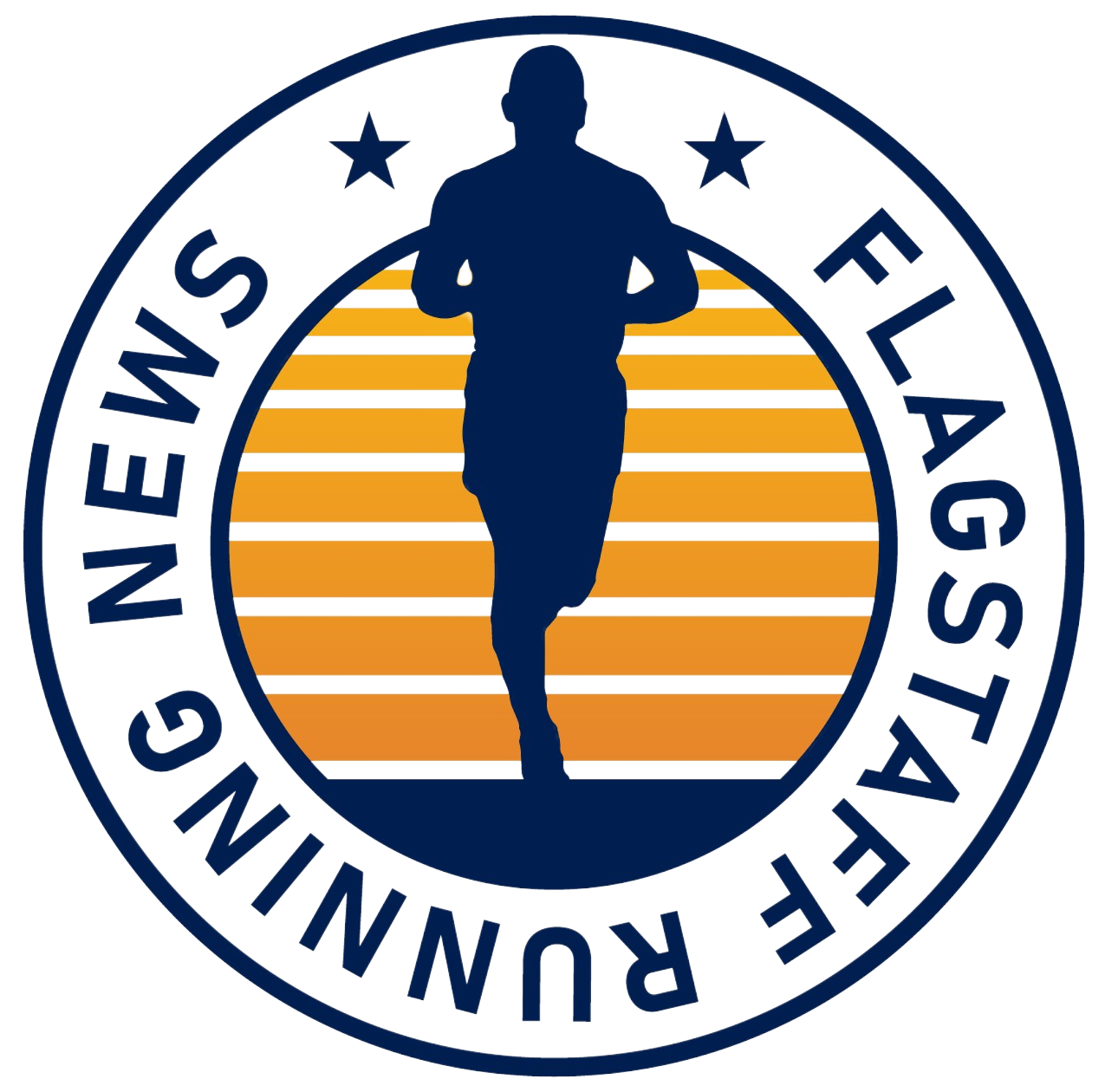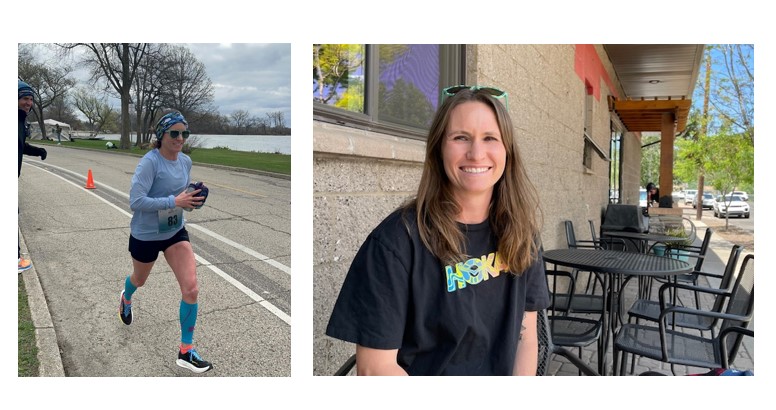Know, right from the start of her saga, that life eventually will get better for Lindsay Prescott, so the tale of woe you are about to read, a series of unfortunate events and fateful calamities, may be daunting and, frankly, a little depressing, but they ultimately serve as inspiration that she’s been able to overcome so much.
Outwardly, Prescott projects an aura of invulnerability, an innate toughness and a no-nonsense just-get-through-it attitude that has served her well throughout her elite running career. Inwardly, same thing, though she acknowledges the dizzying array of physical and emotional challenges has tested her mettle and forbearance.
She is, at 34, now in a better place in all respects. Health. Relationships. Head space.
And she can smile and even laugh, occasionally if ruefully, at the dogpile of adversity that not only derailed her running but negatively affected her life for far too long. Back running now with a vengeance, Prescott’s fitness level is such that she recently became the U.S.’s top 50K road ultra runner, winning April’s Mad City 50K in Madison, Wisc., in a course record 3 hours 21 minutes 36 seconds.
Impressive as the result is on the surface, knowing the backstory makes it seem more memorable.
Here’s what Prescott, herself, posted on Instagram the day before the race – a tidy summary of what had befallen her, but hardly comprehensive:
It has been a long journey, but I have finally made it back to racing. My last marathon was in December of 2020, and since then, I have faced many obstacles that have made it difficult for me to compete. These obstacles include health issues such as blood clots and heart inflammation, a pregnancy loss, appendicitis, and other events like a roll-over car accident, a divorce, and a five-month injury. However, I have pushed through these challenges, to be honest weren’t easy to do. I am finally making it to the starting line of a race healthy.
A fuller picture of her life and times:
— three miscarriages.
— three deep-vein thrombosis blood clots in her right arm
— heart inflammation called myocarditis, which, like the blood clots, Prescott blames on the Covid vaccine and which kept her out of the 2021 Boston Marathon
— a rollover car accident on icy Lone Tree Road heading to a workout, causing a knee injury and whiplash
— appendicitis before a scheduled race
— a nasty case of Covid 10 days before the 2020 Olympic Trials
— a messy divorce that left her a single mother of two forced to re-enter the workforce
— major depression trauma therapy for post traumatic stress disorder
Have we left anything out?
Well, there were some challenges earlier in her career.
In 2010, running for Arizona State University, Prescott looked to be a shoo-in for the NCAA cross country championships, but suffered a stress fracture just before the PAC-10 meet, ran away and finished ninth and ran on the fracture in the Regionals but did not advance to the nationals.
Then there was her first pregnancy in 2014, which not only delayed her elite marathon debut but threatened her life. Prescott suffered first from an extreme case of hyperemesis gravidarum, intractable vomiting that led to ketonemia. Then, later in the pregnancy, she developed preeclampsia, dangerously high blood pressure that can result in stroke, kidney, liver and heart damage. She did not go to term, her daughter Payton, now 9, delivered early.
Despite such a rough first pregnancy, and an SI joint injury that followed when she tried to return to training too soon, Prescott (her married name then was Nelson) was determined to run a marathon in 2016 (though too late for the Olympic Trials qualifying window). Two weeks before her debut at the St. George (Utah) Marathon, she had a miscarriage. But she ran anyway and finished in 2:40 (below the Trials standard at the time).
After a three year gap – her son, Cedar, was born in 2017 after another hyperemesis-laden pregnancy – Prescott finished eighth in the 2019 Twin Cities Marathon in 2:40:13.
All that came before the setbacks detailed in the above bullet points.
How has Prescott endured?
She shrugged, as if to say you do what you must.
Asked if she’d welcome a drama-free year, Prescott took a sip from her iced coffee outside of Flagstaff’s Kickstand Kafe on a sunny June morning and paused for a while before answering.
“Sometimes,” she said, looking her interviewer straight in the eye, “it’d be nice not to have to deal with stuff all the time. You kind of see people’s true colors when you are going through things, who’s actually there, as opposed to them saying, ‘Oh, tell me when you need anything,’ and then they aren’t there.”
Only after it’s mentioned that she seems to have dealt with (or, at least, recounts) her adversity with impressive equanimity does Prescott admit that she’s human, she’s vulnerable, and she’s had a hard time coping.
“I’ve been diagnosed with a major depressive disorder and PTSD because, life, even when I was younger, hasn’t been kind to me,” said Prescott, who has three birds in flight tattooed on her left arm in remembrance of the miscarriages. “It’s (been) hard. But it’s OK not to be OK. I was in a dark spot. After everything, it was almost like too much. I was in counseling, trauma therapy, but my counselor, like, she left. I’m like, ‘Cool, that doesn’t help someone with abandonment issues.’”
That she can still find humor in her plight perhaps shows her resiliency. The physical ailments alone are enough to weigh on anyone’s psyche.

That all started in the buildup to the 2020 Olympic Marathon Trials, held in February, mere weeks before Covid became prevalent in the U.S. and the country shut down. Prescott had the trials standard well in hand and her training boosted her confidence, but then she fell ill with flu-like symptoms two weeks before heading to Atlanta to race.
“Ten days before the race, I couldn’t even run,” she recalled. “I felt all the Covid classic symptoms … I was on breathing treatments, steroids. I was good through mile 20 (at the Trials) but the last six I was just done.”
She finished 81st in 2:42:56 on a hilly course in windy conditions, but unlike other elites having rough days (Emily Sisson, Sara Hall, Molly Huddle), Prescott (then Nelson) decided to finish the race.
“It was hard, but I didn’t drop out. I’ve only DNF’d once (in her career) and it wasn’t going to be then.”
The next year had to be better for her, right? A fresh start in 2021?
She was entered into the elite field in the 2021 Boston Marathon, contested in October after being postponed from April due to the pandemic shutdown. Boston officials required proof of a Covid vaccine to race, so Prescott went to one of Flagstaff’s vaccination centers.
Not even 10 minutes after getting the vaccination in her right arm, Prescott said she started feeling ill.
“I had a severe reaction,” she said. “It’s just how some people’s bodies respond, and I was one of the unfortunate ones. You know how they make you sit in the parking lot for 15 minutes before you can leave after the shot? It was like, maybe five minutes, and I said, ‘I don’t feel good, something’s wrong.’ I couldn’t even drive myself home.
“Two days later, I noticed a thing in my (fore)arm. My neighbor, who’s a nurse, looked at it. I’m like, ‘Am I being paranoid? And he’s like, ‘Go get that checked right away.’”
It was a DVT. Doctors put her on blood thinners, prudent given that blood clots can dislodge and travel to the heart or lungs and be fatal.
“It went away,” she said. “But they came back, and there were three in my arm, came back worse. I had myocarditis, heart inflammation. I had all these straps on me for irregular heartbeat, wore it for eight days. I was on blood thinners for nine months straight. It went away and it came back and had to go back on blood thinners. It’s not cheap, either. Luckily, my cardiologist hooked me up with medicine (samples). It costs $1,000 a month for a lifesaving medicine. …
“I had to drop out of Boston in the fall, because I just didn’t feel good.”
Over the next two years, blood clots in her arm would periodically return, hindering consistent marathon training.
“I saw a vascular surgeon and, essentially, they don’t know,” she said, when asked about the cause of recurring blood clots. “They haven’t come back in a year, so hopefully it stays that way and it’s run its course, finally.”
During this health scare, in 2022, her marriage fell apart.
“He (her ex-husband) had an affair and left during all my health issues,” she said. “So, yeah, that was not easy to go through.”
That left Prescott with joint custody of her two children, but she had rent payments on her house in Flagstaff’s Cheshire neighborhood, so Prescott, who had been a stay-at-home mom, went back to work. She has a bachelor’s degree from Arizona State, but elite running and motherhood took precedent over a career.
She worked at her son’s preschool for a year while training. Prescott was not signed by a shoe company or was part of any team, but she kept training as an unattached runner. Asked whether it’s “doable” being a single mom running 80 miles a week, Prescott simply said, “Well, I’m doing it. Sometimes, I’d do my long run, 26 miles, in the garage with the kids at home.
“You do what you have to do. Some of these women, like, younger people who have like honestly nothing going on in their lives except just running, they have a bad workout and it’s like, the world ends. I’m like, ‘You need a little more adversity in your life. Your life is too easy. Open your eyes.’ I don’t get to lay around and nap. What is that?”

Just when Prescott was up and running again, fate struck once more: First the rollover car crash in January of 2022, then the appendicitis is May.
About the accident, she said, “I was on blood thinners at the time, and I was driving on Lone Tree (Road) going to Lake Mary for a workout, and it was super icy. I was in our sketchy vehicle and tried to slow down the breaks, but the car went sideway, flipped on its side. It rolled over in a ditch. That was kind of, uh, traumatic. I had bad whiplash. (Her) knee was messed up for six months and I couldn’t run. They also worried about internal bleeding, because of the blood thinners.”
Once she healed from the accident and the appendicitis, Prescott’s life – at long last! – took a positive turn. She was able to run again starting in July, 2022, and, later, she met elite ultrarunner Pete Kostelnick, best known as a two-time Badwater 135 Ultramarathon winner and the world record holder for the Coast-to-Coast run across the U.S. (42 days, 6 hours, 30 minutes).
Both had just gone through divorces, and Kostelnick moved from Phoenix to Flagstaff in 2023 to be closer to Prescott.
“Pete’s been great,” she said. “I can actually open up and be emotional and vulnerable with him, cry in front of him.”
With Kostelnick’s help. Prescott quickly learned Excel – she wasn’t left with a computer in the divorce settlement, so borrowed Pete’s laptop – and was hired by Deckers Brand (the parent company of Hoka and Uggs). So now she can work remotely from home dealing with customer service issues for the shoe company while still train as a runner.
For about a year now, Prescott has run without debilitating injuries or other mishaps. About five months ago, she was experiencing hamstring pain, but her PT at Basecamp Physical Therapy, Damien Hiser, diagnosed it as a nerve problem and treated it. By that time, though, it was too late to train to qualify for the 2024 U.S. Olympic Marathon Trials.
At the start of 2024, Prescott toyed with the idea of running an ultramarathon. Nothing crazy, like Kostelnick’s Badwater desert treks, but a road ultra. She looked at the world standard for the 50K on the road (3:33) and thought that, if she trained specifically for the distance, she perhaps could make the top three in 2024 and qualify for the 2025 World Championship U.S. team. Then, she Googled harder and saw that the course record for the Mad City 50K in Wisconsin was held by Autumn Ray in 3:23:16. She set her sights on that.
“I thought, ‘I could probably do that,’” Prescott said. “That’s within my range. So, I was like, ‘I don’t know, let’s try something different.’”
Prescott had only had two months of solid training after her hamstring scare. It proved to be enough time. She trains with former elite runners Trina Painter and Katie McGee in Flagstaff and says the two have been invaluable and supportive both in training and personally.
“My longest run was 28 (miles) and the last eight at 50K goal pace,” she said of her training. “Speed work was at half marathon pace, nothing crazy. I was going over 100-mile weeks, and I stayed healthy this round.”
It showed. Prescott dominated at Mad City, breaking Ray’s course record by nearly two minutes and winning by four minutes.
“My time should get me in to the ’25 Worlds,” she said. “Right now, I have the fastest time in North America for the 50K.”
Hoping all her rough times are behind her, Prescott has plans. She’s slated to compete in the JFK 50 Mile in Maryland in November.
Beyond that? The 2028 U.S. Olympic Marathon Trials. She’ll be almost 39 then, but given all Prescott has been through, age means nothing.


Leave a Reply